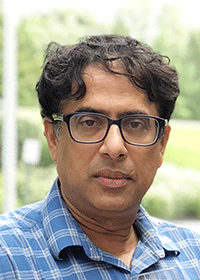Sharp large deviations in sequential inference
Seminar by
 |
|
Bio
Anand Vidyashankar's primary research interests involve biostatistics, statistics, and biotechnology, statistical models for the Internet, statistics in finance, data confidentiality, probability, and stochastic processes. The National Science Foundation and industry partners support his research.Abstract
In modern problems arising in probability and statistics, it is common to encounter sums of random variables sampled up to a stopping time \(T_u\), namely \(S_{T_u}\), where \(\lim_{u\rightarrow \infty} \frac{T_u}{u} = \tau\).
When normalized by \(T_u\),
\(\lim_{u\rightarrow \infty} \frac{S_{T_u}}{T_u} = \theta\).
in probability. We show that there exists a parameter \(\tau_0\) that describes the sharp exponential decay of \(\Pr(\frac{S_{T_u}}{T_u} \in B)\) for any Borel set \(B\); namely,
\(\Pr(\frac{S_{T_u}}{T_u} \in B) \sim u^{-\beta(\tau_0)} \exp(-u \Gamma_{\tau_0}(B)) \qquad \text{ as } u \rightarrow \infty\),
for some large deviation rate function \(\Gamma_{\tau_0}\), where two different asymptotic regimes are possible depending on the value of \(\tau_0\). We use these results to derive the Gibbs conditioning principle, describing the evolutionary behavior of the random variables conditioned on these rare events. Our results can be applied to diverse problems in sequential inference, branching process, privacy, streaming data, and renewal processes arising in actuarial science. In sequential applications, these provide characterizations of the optimality properties of resulting confidence intervals and test statistics. (Joint work with Jeffrey Collamore.)
Schedule
- 2021/12/03 12.00-13.00, Room Seminar -1 @ Povo 0 and online
Details
- Venue: Polo 0
- Language: English
- The participation is free. Please send an email to Prof. Claudio Agostinelli. This is important to book the appropriate room.
- For further information, and credential for online participation, please contact Prof. Claudio Agostinelli